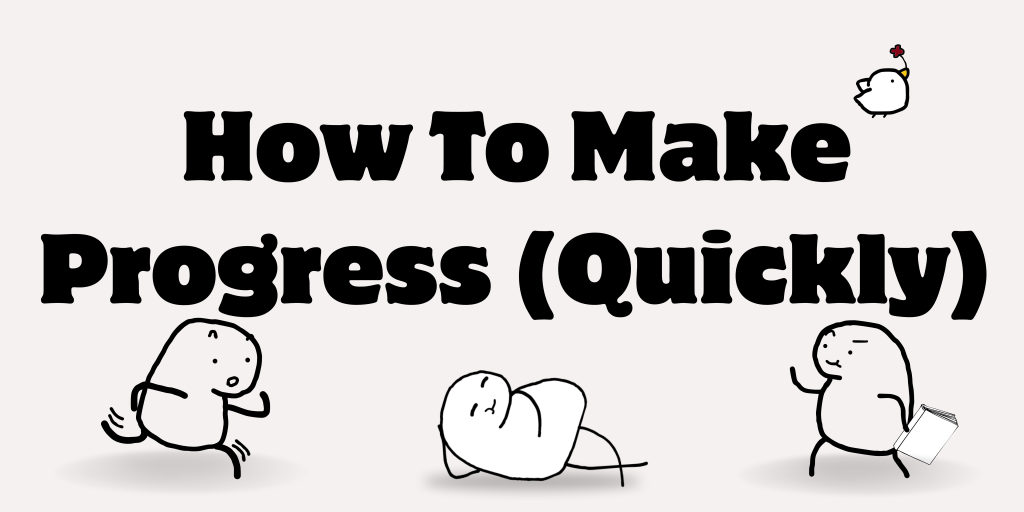During my first years at college, I had a huge problem:
I was a massive disorganized person.
I would attend lessons and take notes of course, but when I came home after college hours (and countless aperitifs with friends), I wasn’t studying anything.
Result:
All the amount of work, book pages not read, and ideas not internalized before. They all accumulated like a huge 4-eyed monster ready to kill me.
I call that monster anxiety.
I could feel his presence especially when exams were approaching. His presence culminated in a mixture of emotions: the fear of failure, the regret of not having done more before, the urgency to take action.
I hope you don’t end up like that, because that’s the fastest path to burnout and feeling completely drained.
Yet, in that short period of time I was the most productive and efficient human being in the world. I realized something that completely altered my psyche and approach to life:
It’s human nature to behave differently when a deadline approaches: we procrastinate less; we reduce every distraction. We lack a sense of urgency, not realizing that every week is important, every day is important, every moment is important. You may delay, but time will not. You won’t have this same energy 20-30 years from now, so better make the most of it!
If you want to master any skill, improve any area of your life, or just make progress in something meaningful to you, I found a simple framework to finally move forward. To take life by its horns and shout: “Move out and let me through!”
Most people overestimate what they can do in a day, and underestimate what they can do in a month. -Matthew Kelly
Every New Year’s Eve, there’s a group of people who dream up wild and fantastic projects (I was an honorary member of that group we can say):
“This year I’m gonna build the best physique!“
“It’s time to start that business and make big money!“
“I will learn to play the guitar 100% this year, trust me!“
You start the first days of January with a big smile on your face, excited to work on that project or on yourself.
Time passes, it’s mid-January and you work a day and stop for two, because you know: “I still have time this year“. The again, it’s June, you realize you’re already falling behind the schedule, and suddenly… you’re back doing the same crap of last year.
It’s hard to commit to anything for a lifetime – even keeping a promise for a year to be honest. There’s a solution to that:
Periodization.
In sports, athletes train intensively on a specific skill for 4-6 weeks before moving on to the next skill. In most industries, results spike in the last quarter because people go for a 60-day push or 100-day push to hit their targets. As athletes work on a skill for a shorter period of time, you can make progress faster than you think.
Let’s redefine a year:
A year is no longer 12 months, it’s now only 12 weeks. Each 12-week period is treated like a full year. At the end of each 12 weeks (just like you do at the end of every year) you take a break, celebrate, and reload.
With this 12-week year, you’re not asked to make a lifetime or annual commitment. Just a 12-week one. Don’t you think it’s easier to keep a commitment for 12 weeks rather than 12 months?
Absorb the concept. If you plan 12 months ahead, you lack a sense of urgency. That’s when you realize every week and day is vital. Stop thinking in terms of a year; focus on shorter time frames.
There’s nothing like a deadline to get you motivated
Pick a goal you really want to achieve in 12 weeks.
12 weeks is long enough to get things done and yet short enough to keep a sense of urgency. With this plan, you identify the top 1-3 actions that are most important to reach your goal.
Everything else is not essential. The most invisible form of wasted time is doing a good job on an unimportant task: that is dead time.
Now, you can be smart and have access to lots of information and great ideas. You can work hard. Have tons of natural talent. But you have to execute. The difference between high-performance people and low-performance ones is not knowledge, strategy, or information. It’s execution.
Execution requires taking new and important actions every day. But the problem is: important actions are uncomfortable by nature. The number one thing you will have to sacrifice to execute on your plans is your comfort.
The recipe to stealing hours from comfort is this: if you want to execute your tasks every single day and not procrastinate, your vision must be more exciting to you than the pleasure around you.
In essence, the personal vision is the reason to why we work in the first place. If you don’t have a strong vision, you won’t have a reason to go through the pain of change.
The secret to living your life to its potential – and to make progress- is to value the important stuff above your own comfort. At the end of the day, the distance between you and your dreams is just a bunch of repeated actions.
So, close this article, put your phone away, and start doing (but don’t forget to subscribe to the blog)!
